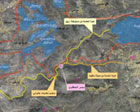Israeli settlement sewage contaminating Palestinian water supply
 Tuesday, September 30, 2008 at 11:50PM
Tuesday, September 30, 2008 at 11:50PM  Najib Farrag / Bethlehem
Najib Farrag / Bethlehem
Palestine News Network
30.09.08 - 11:35
http://english.pnn.ps/index.php?option=com_content&task=view&id=3650&Itemid=1
The Applied
Research Institute, ARIJ, compiled data indicating that Israeli
settlements are a major environmental threat to the West Bank as they
openly spill wastewater.
The Palestinian Ministry of
Environmental Protection, along with the Israeli Authority for the
Protection of Nature and National Parks and the Israeli Civil
Administration are monitoring pollution in the West Bank.
Their
studies indicate that the main source of contamination of the water
supply is wastewater flowing into Palestinian population centers.
The
Israeli governmental agencies did not openly state that the wastewater
is coming from Israeli settlements, but ARIJ did and the fact has
already been documented by several other sources, including by the
naked eye that can see sewage flowing out of some settlements and into
neighboring Palestinian towns and agricultural lands. The environmental
threat posed by Israeli settlements in the West Bank and East Jerusalem
is as brutal as the physical threat posed by the settlers themselves to
the land and population.
The Institute points out that the West
Bank, save for the colonized blocks, is being transformed into a
garbage dump while a significant degradation of soil quality and
depletion of natural resources are both noted.
Untreated waste
water is pumped into Palestinian agricultural areas without any
commitment to environmental standards and with blatant indifference to
the population. About half a million settlers in the West Bank,
including East Jerusalem, produce some 54 million cubic meters of waste
water annually.
The 2.3 million Palestinians in the WBEJ produce
52 million cubic meters of waste water annually. That means that
Israeli settlers consume five times more water than Palestinian
citizens.
ARIJ also pointed out that the Israeli government
collects taxes from Palestinians but uses the revenue “in the interests
of the occupation authorities and settlers.” The Institute continued in
its report, “The facts indicate that Israeli management of the water
and sanitation sector is violation of norms and agreements even during
the various stages of the peace process when agreements have been made
through peace treaties for environmental protection.”
The
Israeli Ariel Settlement, built on land of the northern West Bank’s
Salfit District, is dumping its waste water into the neighboring valley
which feeds into the underground basin in the western region.
Also
in the northern West Bank towns of Kafr Deik and Burquin near the Green
Line a waste water treatment facility was planned to be built in
cooperation a German agency but due to obstacles placed by Israeli
forces the project was prevented from going through. The Israelis
needed to give consent because the building site was in Area C. They
refused and said that they would agree only if it was to be a joint
treatment facility for Israeli settlement waste water and that from
Palestinian cities. The Palestinians refused this as it was an attempt
to legitimize illegal Israeli settlements on Palestinian land.
The
case of Bethlehem and Jerusalem was similar in regard to Israeli waste
water flowing into Wadi Nar, the Valley of Fire. Settlements built in
East Jerusalem such as Ma’ale Adumim are flowing strait into
Palestinian land. The occupation authorities rejected plans for a
Palestinian waste water treatment facility in Tulkarem and insisted it
be built on the other side of the Green Line in order to take the
treated water for their agriculture and a discounted price.
It
should be noted that the Israeli government has frozen 150 projects in
the area intended to improve basic infrastructure and services,
particularly water and sanitation services for the Palestinian
population under the guise of security concerns.
The report
issued by ARIJ reiterates other findings indicating that presently
Israel has seized more than 80 percent of fresh water resources.
 APJP |
APJP |  Post a Comment |
Post a Comment |